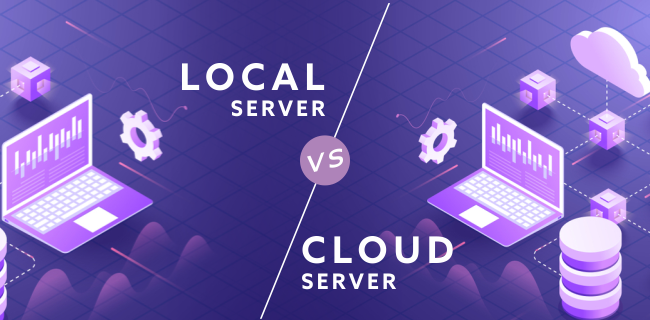Data is rightly said to be the lifeline of a business. Continuously data is being collected and stored by businesses to keep records, to file returns and to create insightful reports out of this data. Keeping data safe is a top priority of every business. There are two ways in which data is stored either on a local server or on a cloud server.
Local server
Servers are huge computer hardware that is mostly given the task of managing, storing and retrieving data when demanded by a user. Local servers are servers purchased by a company, placed in the company used for managing data of its own company only. It is not only purchased but also maintained by the company whose data is saved within the server. These local servers are also called in-house servers, on-premise server, etc.
Cloud server
In Cloud Server, server space is purchased instead of a physical server hardware. These servers are maintained by the supplier as opposed to a local server. The supplier has huge servers and rents out server space to different businesses as per their space requirements.
Deciding whether to purchase a local server or invest in a cloud server is a dilemma that needs to be solved. In this blog, next, we will see the pros and cons of both local server and cloud server.
Pros and Cons of Local server
Pros -
Better Control - Since it is an in-house server, in case of any problem the internal team can quickly solve it on a priority and make sure the employees' productivity is not affected.
Easy maintenance due to availability of Internal Team - Local servers are being used by businesses since the start of time. This is why, today we have an abundance of skilled IT personnel who can easily manage the upkeep of the local server. Easy availability of IT personnel make local server upkeep easy.
Cons -
Higher Costs – Servers run on electricity and consume a lot of electricity as they have to be run throughout the day. There also has to be a specialized IT person or team to take care of servers and to maintain it. Other than electricity costs and IT team costs, servers also occupy a lot of storage space thus causing them to spend on office space. Thus a lot of costs are associated with local servers.
Lesser data security - When compared with a cloud server, local servers provide lesser data security. It depends on the internal IT team what data security protocols they set for the data and whether they are familiar with the changing trends and types of online data security threats.
Slower adaptability - Businesses grows and shrinks from time to time. Local servers do not have the amount of flexibility needed when a business scales up or down. This will cause constraints and complex problems for a business.
Pros and cons of Cloud Server
Pros -
Experienced professionals - In the case of a cloud server, the cloud supplier is an expert and is up-to-date with the needed security and protocols to be taken in case of an emergency. Their expertise is so huge that businesses can rely on it for their data security. Responsibility for data security is shifted from businessmen to the supplier.
Added Data Security – Since the Cloud suppliers have expertise in data security they are completely aware of the changing standards of cyber-security and hence the complexity of data security is updated from time to time. They provide two-level data security when compared with local servers.
Flexible – Cloud servers are flexible they can be used as per the requirement. Easily one can scale up or scale down the cloud requirements.
24/7 Data access – Data accessibility is the top benefit of using a cloud server and when data is made available 24/7 the profitability of the business sky-rockets. This is because the employees of the business can work at any time they want as the data is always available in the cloud server system.
Lower costs – A cloud server is an investment that is a one-time setup. Maintenance, backup, software upgrade and other complex tasks are to be carried out by the supplier. This allows the business to focus on its business and not data servers. The cost is less as the suppliers manage the servers thus internal IT team is not required, electricity costs for running servers are borne by the supplier, security, software and systems have to be handled by the supplier and thus the only expense the business has to pay is for the cloud.
Customized Plans - In cloud servers, you can choose what services, storage space, backup systems, levels of data security, etc you want to use for your business data. Thus the plan is customisable as per your requirement and you do not have to pay what big companies are paying for larger space.
Saves office space – Servers occupy space. But in the case of cloud servers, these physical servers are stored in the supplier’s place and hence saving office space for businesses.
Cons –
Transition costs – Time and costs when considered while moving from a legacy system should be considered. But this is inevitable and has to be done at some point in time.
High initial investment – Initially the costs may seem overwhelming. But in the long run, the indirect benefits of cloud server outweigh its costs.
Requires internet – A stable internet is required from both ends - the provider end and the user end. If not, the user may not get the required data.
Businessmen have to consider all these points before deciding where to keep their data. Deciding mostly depends on the security of the data. Viruses like Ransomware and others can harm your data to such an extent that it can cost you thrice the amount you might end up spending while moving to a cloud server. As per a report developed by Business Standard (e-newspaper), based on a survey of Indian companies, as much as Rs. 8 crore ransom has been paid by Indian companies to fix ransomware attacks.
We suggest, always look for options that keep your data secure. If data security is your top priority then a Cloud server is for you.


